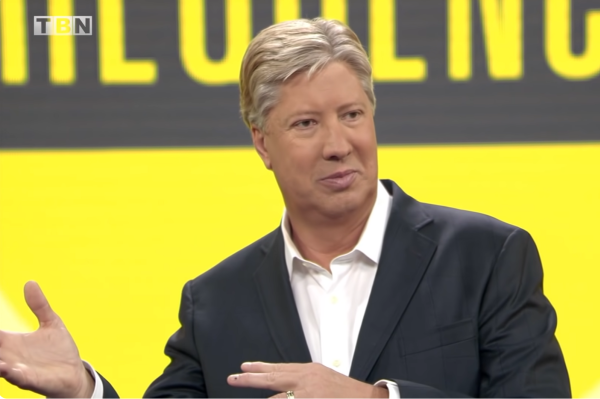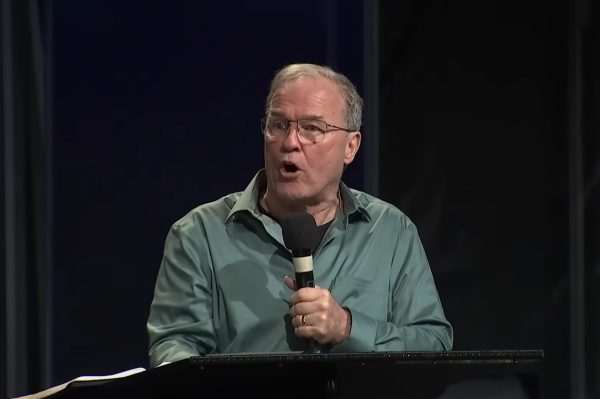Will Stormy Daniels, Russia Collusion Claims Lower Evangelical Turnout in Midterms? Ralph Reed Answers

WASHINGTON - There is no reason to believe that white evangelical voter turnout will fall off in the 2018 midterm elections because of President Donald Trump's porn star controversy or the investigation of Russian interference in the 2016 presidential election, prominent evangelical activist Ralph Reed has said.
Reed, an informal adviser to the Trump administration and the founder of the Faith & Freedom Coalition, asserted Friday that it could be argued that such a staunch media focus on Stormy Daniels (Stephanie Clifford), and Russia could actually play in the favor of Trump and Republicans in 2018.
Reed, whose organization is holding its annual three-day Road to Majority conference this weekend at the Omni Shoreham Hotel, hosted a group of national reporters for a lunch discussion Friday afternoon in which he talked about the upcoming congressional races.
As this year's midterms carry vital significance for the future of the Trump/Pence pro-family and pro-life agenda, the 56-year-old Reed expanded on Faith & Freedom's efforts to drive out the Christian conservative vote and help Republicans increase their slim majority 51-49 majority in the United States Senate.
Given the fact that Trump's alleged affair with the porn star and the allegations of his campaign colluding with Russians in the 2016 election have gotten much play in the mainstream media, Reed was asked if he thought such media focus on those items would lead to a fall off in evangelical turnout in 2018.
As evangelicals were such a vital part of Trump's win in 2016, with exit polls showing about eight in 10 self-identifited white evangelical voters voting for the thrice married business tycoon, Reed wasted no time in shooting down that question.
"No," he said. "We are not seeing it. We are not seeing a diminution in support. I think the last, what I consider to be methodologically reliable, published poll, I think the job approval for the president [among evangelicals] was roughly [75] percent. That is really strong."
"The intensity is there and [Trump] just keeps doing the right thing,'" Reed said, referring to Trump's policies. "I would argue, not too strongly because I wouldn't press the argument, but I think an argument could be made that it might actually be helping him."
Reed went on to explain that the media's pushing of those particular issues will at some point force the social conservative Trump base to go "OK, enough already."
"When some cable networks and some news organizations kind of turn [it] into a telethon and [Stormy Daniels' lawyer] Michael Avenatti is basically low-fiving his way to a CNN set for like eighth time that day, it starts to strike the voter as too cute by half and it starts to go the other way," Reed suggested.
Reed argued that many voters will see the media focus on those issues as a way to try to "manipulate" them.
Reed explained that he saw such a reaction in the 1998 midterms after Republicans attacked President Bill Clinton over his sexual moral failings.
"I definitely saw that in [1998] when the [Ken] Starr report hit and Henry Hyde made it clear that we were going to report out articles of impeachment. You can just feel it out there," Reed said. "In middle August, we were going to pick up five to 20 seats and then you just felt it whipsawing us where the Democratic base voters go, 'Oh really, so that's what your planning on?'"
The composition of both houses of Congress remained unchanged after the 1998 midterms.
Reed explained that during the mid-1990s, he opposed Republican efforts to attack President Clinton over his moral failings and even declared it in his 1996 book Active Faith: How Christians are Changing the Face of American Politics.
"I feared we were risking doing long-term damage to the presidency by making the attacks against Bill Clinton so vicious and so about his moral character and alleged moral failings, rather than about his policy views," Reed said. "In that same book, by the way, I criticized the organizers of CPAC for having Paula Jones announce her lawsuit at CPAC [in 1994]. I refused to participate in the news conference. "
"I also met Newt [Gingrich], [Tom] DeLay and [Bob] Livingston for the 15 minutes that he was the candidate for speaker, everyone of them," he added. "I said, 'Guys, you are going to drive this flaming Buick right off a cliff because what you are about to do isn't going to create a single job, it's not going to strengthen a single community or family, it's not going to increase anybody's wages.'"
Reed added that in looking back even further in history, the act of bashing candidates on their moral failures has proven not to work so well.
He pointed to 1884 when Republicans would chant "Ma! Ma! Where's my pa?" to slam Grover Cleveland, who was accused of fathering an illegitimate child but ended up winning that year's presidential election.
"Look, if it doesn't work in the 1880s, I don't think it is going to work in 2018," Reed said.
Reed also pointed out that the evangelicals in 2016 were also faced with the reality of Trump's moral misbehaviors but still decided to vote for him in November 2016.
"They had a full understanding of the fact that [Trump] had lived a very interesting life and had been married three times," Reed said. "The Access Hollywood tape came out and you had the Gloria Allred news conference and all that was out there. It was fully litigated during the course of the campaign."
According to Reed, the Trump administration has already accomplished much that the president promised his social conservative, pro-life base. Reed said that Trump has provided the "most conservative, pro-family policy victories in a shorter period of time" than he has ever seen in his career.
"It is more than we had under Bush 43, more than we had under Newt as speaker," he said.
One of the major Trump campaign promises left unfulfilled is the vow to completely repeal the Johnson Amendment, a law that puts churches and pastors at risk of losing tax-exempt status if they engage in any sort of politicking.
Although Trump vowed to eliminate the 1954 law, it can only be undone by an act of Congress.
Reed said Faith & Freedom Coalition is pressuring congressional leaders to get a Johnson Amendment repeal measure attached to a must-pass piece of legislation before the midterms.
"It is going to make a big difference on turnout and energy in the evangelical community," he said.
The Faith & Freedom Coalition is ramping up its get-out-the-vote campaign for the 2018 midterms and plans to spend four times as much as it did for the 2014 midterms.
One of the states that Reed is most excited about is Florida, where Republican Gov. Rick Scott is challenging Democrat Sen. Bill Nelson for his senate seat.
"We think [Scott] is not only the only one that can beat Bill Nelson, we feel really good about his chances," Reed stressed. "We have a very strong organization in Florida. We knocked on over 300,000 doors in Florida in 2016 and we will knock on at least that many in 2018."
The organization also feels good about states like Indiana, North Dakota and Missouri. Reed admitted that they are on the defense in states like Nevada and Arizona.
"The most important thing on the Senate side is not trying to figure out who is going to win or who is going to lose because you really can't do that. It is putting more seats in play than they have seats in play," Reed said.
Reed warned that Democrats are "fired up" and will vote in "really big numbers."
"We saw that in Virginia in 2017 and we saw that in Pennsylvania and we saw that in Georgia's sixth [congressional district]," he said. " We were deeply involved in all of those places. It is sort of the mirror image of the Tea Party in 2009 and 2010."






















